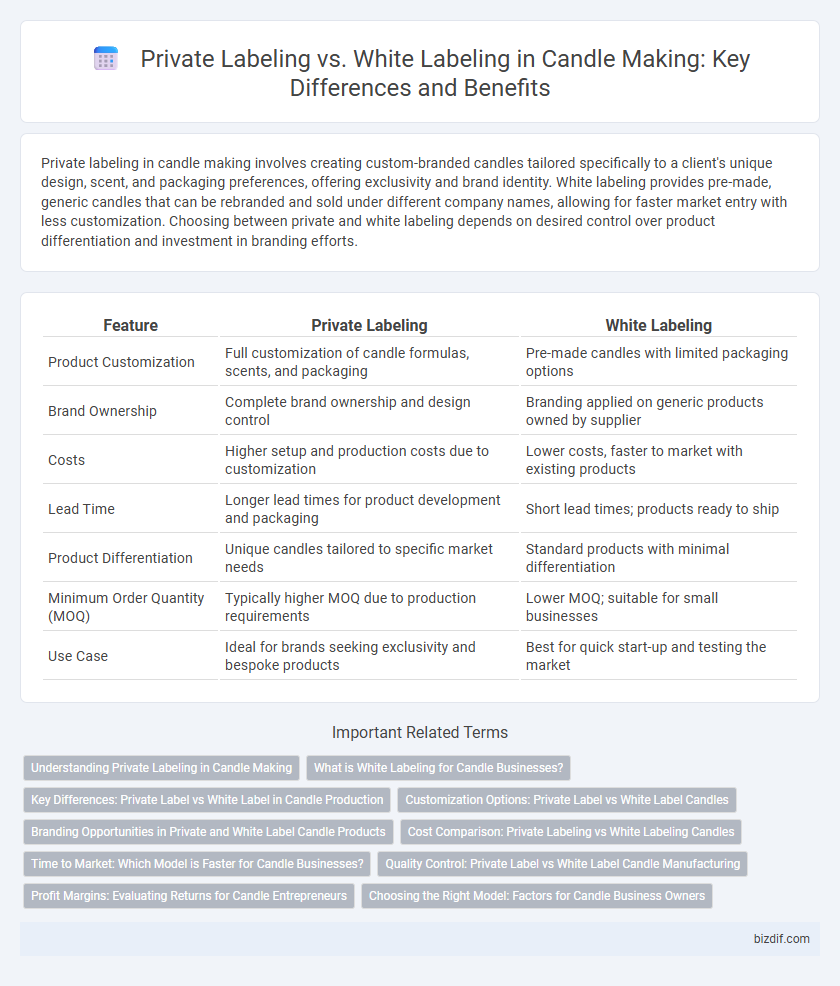Private labeling in candle making involves creating custom-branded candles tailored specifically to a client's unique design, scent, and packaging preferences, offering exclusivity and brand identity. White labeling provides pre-made, generic candles that can be rebranded and sold under different company names, allowing for faster market entry with less customization. Choosing between private and white labeling depends on desired control over product differentiation and investment in branding efforts.
Table of Comparison
| Feature | Private Labeling | White Labeling |
|---|---|---|
| Product Customization | Full customization of candle formulas, scents, and packaging | Pre-made candles with limited packaging options |
| Brand Ownership | Complete brand ownership and design control | Branding applied on generic products owned by supplier |
| Costs | Higher setup and production costs due to customization | Lower costs, faster to market with existing products |
| Lead Time | Longer lead times for product development and packaging | Short lead times; products ready to ship |
| Product Differentiation | Unique candles tailored to specific market needs | Standard products with minimal differentiation |
| Minimum Order Quantity (MOQ) | Typically higher MOQ due to production requirements | Lower MOQ; suitable for small businesses |
| Use Case | Ideal for brands seeking exclusivity and bespoke products | Best for quick start-up and testing the market |
Understanding Private Labeling in Candle Making
Private labeling in candle making involves creating unique candles specifically designed and branded for one retailer, offering customized scents, packaging, and labels that align with the brand's identity. This approach allows candle makers to deliver exclusive products tailored to a client's specifications, enhancing brand differentiation and customer loyalty. Unlike white labeling, which features generic products sold by multiple retailers, private labeling emphasizes originality and control over product design and brand presentation.
What is White Labeling for Candle Businesses?
White labeling for candle businesses involves purchasing pre-made candles from a manufacturer and selling them under your own brand name without customizing the product itself. This approach allows entrepreneurs to quickly enter the market with minimal investment in product development or manufacturing processes. White labeling enables candle sellers to focus on branding, marketing, and distribution while leveraging established production capabilities.
Key Differences: Private Label vs White Label in Candle Production
Private label candle production involves creating custom-branded candles tailored to specific client requirements, offering unique scents, designs, and packaging exclusive to the brand. White label candles are pre-manufactured products sold by multiple retailers under their own brand name, providing faster market entry with standardized options. The key differences lie in customization level, exclusivity, and production control, with private labeling enabling personalized product identity, while white labeling focuses on convenience and scalability.
Customization Options: Private Label vs White Label Candles
Private label candles offer extensive customization options, allowing businesses to design unique scents, packaging, labels, and wax blends tailored to their brand identity. White label candles typically provide pre-made products with limited or no customization, focusing on faster market entry and lower costs. Customization flexibility in private labeling supports stronger brand differentiation and personalized customer experiences compared to the standardized approach of white labeling.
Branding Opportunities in Private and White Label Candle Products
Private labeling allows businesses to create unique candle designs and customize packaging, fostering strong brand identity and customer loyalty. White labeling offers ready-made candle products with generic branding, providing quicker market entry but limited differentiation. Both approaches enable brand presence in the candle industry, with private labeling offering greater control over product innovation and brand storytelling.
Cost Comparison: Private Labeling vs White Labeling Candles
Private labeling candles typically involves higher costs due to custom formulations, unique packaging, and brand-specific designs, whereas white labeling candles offer lower expenses by providing pre-made products with minimal customization. Private labeling demands investment in product development and branding, leading to increased upfront costs, while white labeling enables faster market entry with standardized inventory and reduced production overhead. Businesses prioritizing cost-effectiveness often opt for white labeling, whereas those seeking brand differentiation invest more in private labeling strategies.
Time to Market: Which Model is Faster for Candle Businesses?
Private labeling candle products often requires longer lead times due to custom formulation and branding adjustments, impacting the overall time to market. White labeling involves ready-made candle products that can be quickly rebranded and sold, significantly accelerating market entry for candle businesses. Choosing white labeling enables faster product launch cycles, ideal for businesses prioritizing speed over customization.
Quality Control: Private Label vs White Label Candle Manufacturing
Private label candle manufacturing offers greater control over quality standards, allowing customization of scents, wax blends, and packaging to meet specific brand requirements. White label candle manufacturing typically provides pre-made products with limited options for customization, resulting in less influence over ingredient quality and design consistency. Brands prioritizing unique formulas and stringent quality control often prefer private labeling to ensure their candles stand out in the competitive market.
Profit Margins: Evaluating Returns for Candle Entrepreneurs
Private labeling in candle making offers higher profit margins by allowing entrepreneurs to create unique brand identities and customize product formulas, increasing perceived value and pricing flexibility. White labeling provides faster market entry with lower upfront costs but typically yields slimmer returns due to standardized products shared across multiple sellers. Candle entrepreneurs should evaluate profit margins alongside brand control and marketing potential to maximize long-term revenue growth.
Choosing the Right Model: Factors for Candle Business Owners
Private labeling in candle making involves customizing products with unique branding and formulations, offering greater control over design and quality, while white labeling provides ready-made candles branded with the business owner's logo, enabling faster market entry. Candle business owners must assess factors such as budget constraints, desired brand differentiation, production timelines, and scalability when choosing between private and white labeling. Prioritizing long-term brand identity and customer loyalty often favors private labeling, whereas white labeling suits businesses focusing on quick launch and lower upfront investment.
Private labeling vs White labeling Infographic

 bizdif.com
bizdif.com